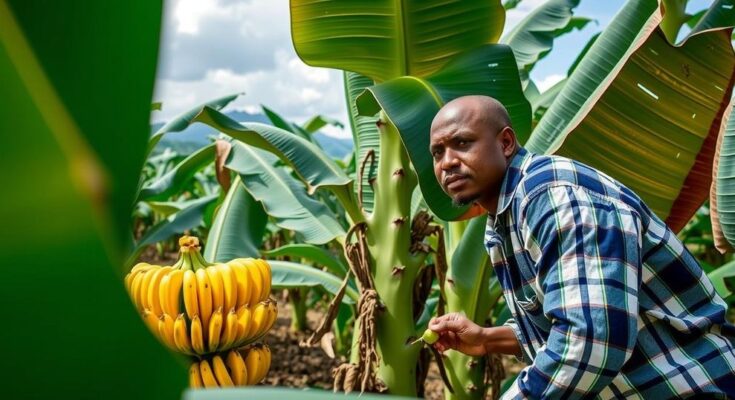In Uganda, banana farmers like Ahumwire Justine are facing devastating impacts from climate change, including severe storms. In response, the NDC Action Project is providing a digital platform for crop insurance that has trained farmers to document storm damage, improving their resilience and financial stability. This initiative aims to expand to 50,000 farmers, ensuring they have essential support during extreme weather events.
In the southwest of Uganda, banana farmers like Ahumwire Justine are increasingly vulnerable to the adverse effects of extreme weather due to climate change. Last October, a severe hailstorm devastated Justine’s plantation, destroying 300 banana trees and leading to the death of two cows. “We had no food, no money for school fees for my children and no food for my animals,” laments Justine, a mother of four, as she considered abandoning her uninsured two-hectare plot. According to the Intergovernmental Panel on Climate Change, such climatic disturbances are occurring more frequently and intensely. In light of this, the NDC Action Project, a collaboration between the United Nations Environment Programme (UNEP) and the UNEP Copenhagen Climate Centre, is implementing strategies to bolster farmers’ resilience against increasingly severe weather conditions. “We know farmers, particularly smallholders, are struggling to adapt to the effects of the climate crisis,” stated Mirey Atallah, Chief of the Adaptation and Resilience Branch within UNEP’s Climate Change Division. This initiative combines technical and financial support, fostering resilience and averting catastrophic impacts on farmers due to extreme weather. Bananas are a vital component of Uganda’s economy, with 47 percent of farmers engaged in their cultivation as of 2019. They serve not only as a food source but also provide plant fibers for ropes and mats and leaves for mulching and packaging. However, unpredictable weather patterns, attributed to climate change over the past 15 years, have jeopardized the future of banana farming. Florence Muranga, Director of the Banana Industrial Research and Development Centre, emphasizes the perilous situation: “[Farmers] can lose their food, their livelihood, their house in one day.” The Banana Industrial Research and Development Centre, representing 5,000 banana farmers, is crucial in expanding access to crop insurance, training farmers to use smartphones to document their crops and any resulting storm damage. When storms occur, images are uploaded to a digital platform, allowing agroeconomists to assess the damage. Impressively, nearly 50 percent of the participants in the training were women. The initiative employs what is termed ‘Champion Farmers’ to mentor other farmers in technology use. This project also collaborates with Agriculture and Climate Risk Enterprise Africa to connect smallholder farmers with insurers, delivered via Agro Consortium Limited, which comprises 13 insurance companies. The digital nature of the insurance facilitates faster claim processing and reduced premiums. Furthermore, farmers receive training in water management and agroforestry, significantly improving productivity and minimizing climate-related losses. The success of this pilot program will now expand its coverage to all 5,000 farmers associated with the Banana Industrial Research and Development Centre, with plans to incorporate an additional 50,000 banana farmers nationwide. For Justine, the introduction of crop insurance brings invaluable peace of mind: “I know that if [my crops get damaged] I have help. It’s not like in other years, where I would have to start from zero.”
The increasing vulnerability of banana farmers in Uganda is closely linked to the escalating impacts of climate change, which have resulted in more frequent and severe weather events. As a staple crop integral to the Ugandan economy, the cultivation of bananas supports the livelihoods of a significant portion of the agricultural population. However, unpredictable rainfall patterns—characterized by extended periods of drought followed by intense storms—pose a serious threat to these farmers. The NDC Action Project exemplifies an innovative approach combining crop insurance and technology to enhance farmers’ resilience to climate impacts, reflecting broader efforts to address the challenges posed by climate change in agriculture.
The implementation of innovative insurance solutions, such as those offered by the NDC Action Project, represents a significant advancement in supporting Uganda’s banana farmers against the uncertainties brought about by climate change. By utilizing technology to document crop conditions and damage while providing essential training, the project not only mitigates farmers’ financial risks but also enhances their productivity and resilience. This model holds promise for safeguarding the livelihoods of farmers, ensuring food security amid evolving climatic challenges, and potentially serving as a blueprint for similar agricultural initiatives worldwide.
Original Source: www.unep.org




